30 de septiembre 2020

Children of Exile: The Births “Sowing Hope” in the Camp of Nicaraguan Farmers

PUBLICIDAD 1M
PUBLICIDAD 4D
PUBLICIDAD 5D
Citizens wearing face masks; businesses with extreme measures; and half-filled movie theaters. This is the new Managua shaped by the covid-19
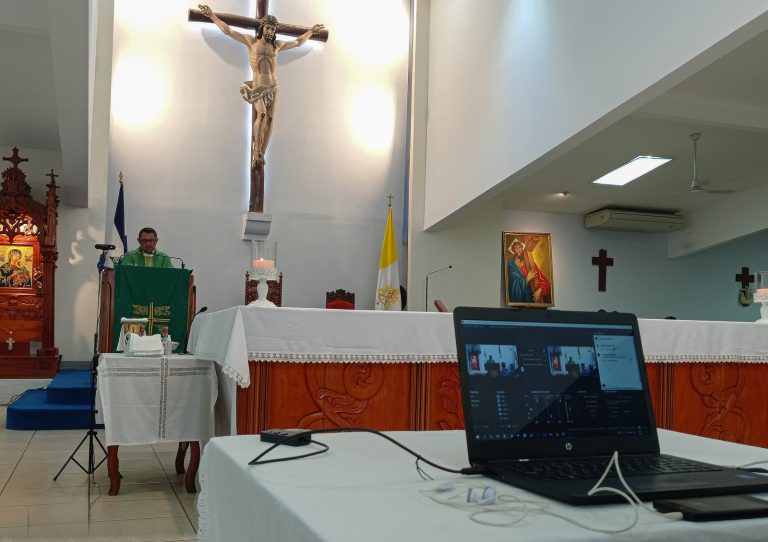
It’s been six months since the pandemic arrived in Nicaragua. In that time, the routines and lifestyles of Managua’s residents have undergone a 180-degree turn. From shopping to receiving the Holy Sacrament, not to mention getting on a bus, Covid-19 leaves a new Managua.
Residents now include such items as face shields, masks, gloves, and surgical caps in their lists of basic supplies. Today, the face mask is an indispensable accessory. Without it, you can’t enter a bank, shop, or supermarket.
After the hospitals, public transport is considered one of the places that pose the greatest risk. Because of that, certain transportation cooperatives demand that passengers use face masks. They also order drivers to wash their hands at each terminal. In addition, they’ve constructed a plastic divider on the right side of the driver’s seat. There’s only a small opening where the operator can receive fares. The idea is to have minimal contact with the passengers.
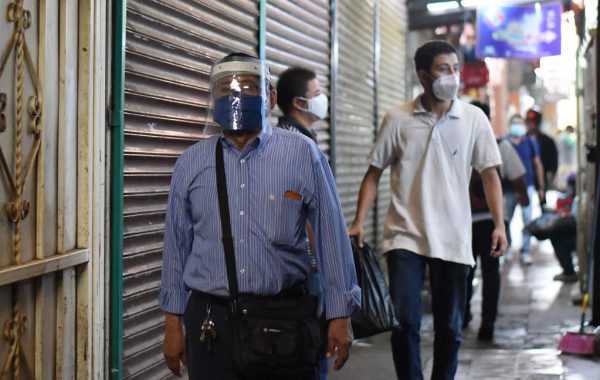
Some citizens take extreme measures. They use face shields, goggles, and face masks at the same time, to avoid contagion.
Managua, the most populous city in Nicaragua, reports the highest percentage of suspected COVID-19 cases. According to the independent monitoring organization “COVID-19 Citizen’s Observatory”, Managua has seen 3,794 cases of the virus. The Observatory also reports 901 deaths in the capital from COVID during the six months of the pandemic. These deaths include 72 from pneumonia.
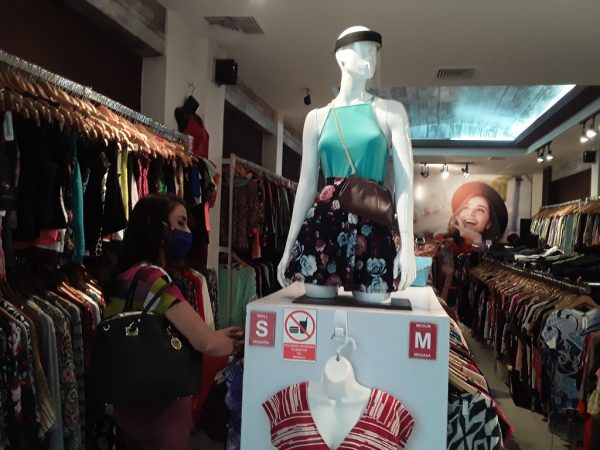
Clothing stores now include face masks and hand sanitizer among their products.
When the country’s first positive case of COVID-19 was announced last May 18, countless businesses temporarily closed their doors. However, in the last two months, they’ve begun to reopen for customers, with certain restrictions. Restaurants must keep a distance between tables. All personnel must use masks and face shields. Clients must pass a temperature check before entering, and everyone must apply hand sanitizer.
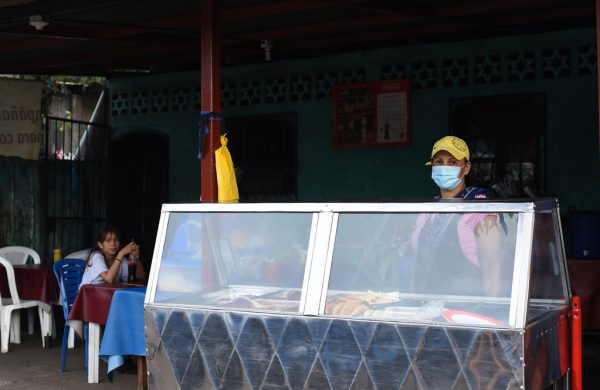
Food stands put out water buckets with anti-bacterial soap, so customers can wash their hands before entering.
Some of the restaurants and popular food stands have set aside a space for washing hands. These range from simple buckets of water to automated handwashing sinks.
Orthodontist Camila Berhein panicked when Nicaragua’s first COVID-19 case was announced. She immediately canceled all her appointments and didn’t return to work until mid-July. Dr. Bernhein is aware that her profession is “more exposed” to infection, since “saliva is the main path of transmission”.
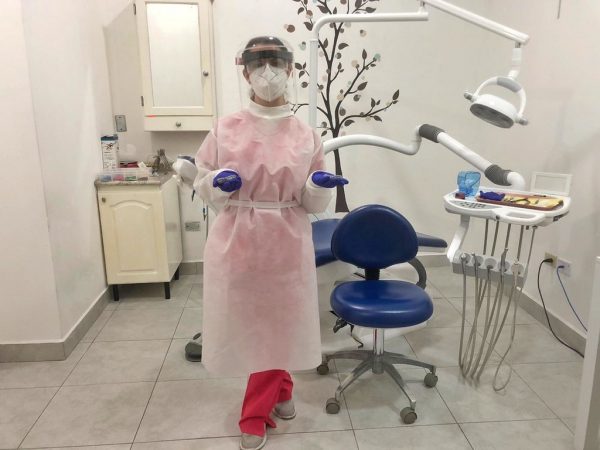
Health professionals must remain for hours in protective suits. Those who see patients in the private clinics assume the cost of these suits. Courtesy photo / Confidencial.
Berhein has invested in protective equipment such as robes, face shields, thermometers and chemicals to sanitize her clinic. After each patient, she wipes down the area with quaternary ammonium compounds.
The doctor wears her protective suit six hours a day. “It’s been a process of adaptation. In the beginning, it made me claustrophobic. A few times, I had to excuse myself from the patient to take a break. I needed to remove the shield and goggles a minute to breathe. Now, I don’t even feel the weight of everything I put on. I got used to it,” Bernhein says.
“Cinema”, one of the two movie chains in Managua, has reopened, but using only half of their space. They’re allowing the use of only 36% of the seats, leaving every other row of seats empty. At the end of every showing, the installations are sanitized. At the ticket booths, the personnel are shielded behind acrylic screens.
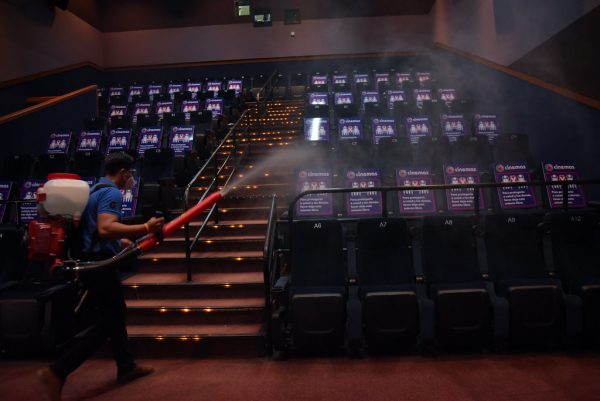
At the end of every showing, workers at the “Cinema” movie houses sanitize the rooms.
For those who still don’t plan to step into a movie theater, two drive-in theaters have sprung up. Screens have been installed in large parking lots, so that people can watch the movies from their cars. They connect to a radio station where they can hear the sound.
In the markets, the vendors have changed their hours of attention. Now, they open later and close earlier. In some cases, the vendors have installed buckets with soap and water. They ask customers to disinfect their hands before they wait on them.
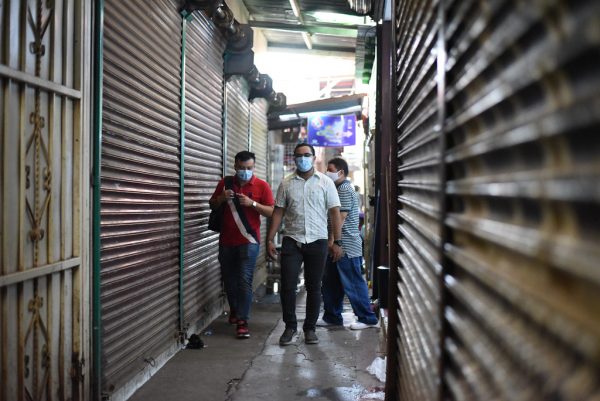
The market vendors now open later and close earlier.
Yet another custom that has changed for Managua residents is that of attending the Catholic Church’s religious activities. Beginning March 26, Cardinal Leopoldo Brenes completely ended the massive presence of worshippers in the Churches, to avoid spreading the virus. Priests hold masses online, on Zoom or Facebook Live.
The Managua the pandemic has shaped is also one where the gutters are full of discarded masks. Some citizens throw them out the window of buses and vehicles. These used masks have begun to accumulate around the markets and main streets of the capital city.
PUBLICIDAD 3M
Confidencial es un diario digital nicaragüense, de formato multimedia, fundado por Carlos F. Chamorro en junio de 1996.
PUBLICIDAD 3D